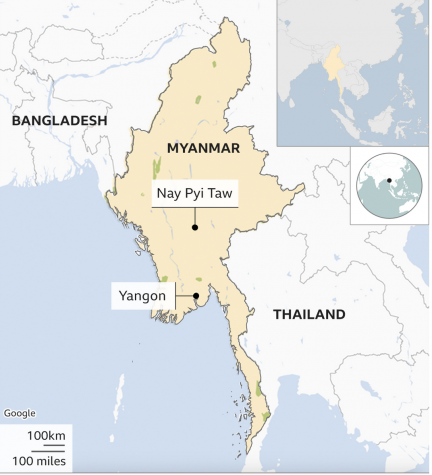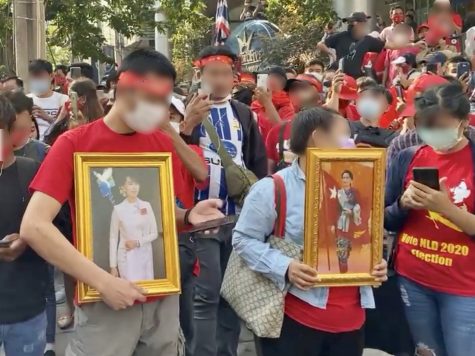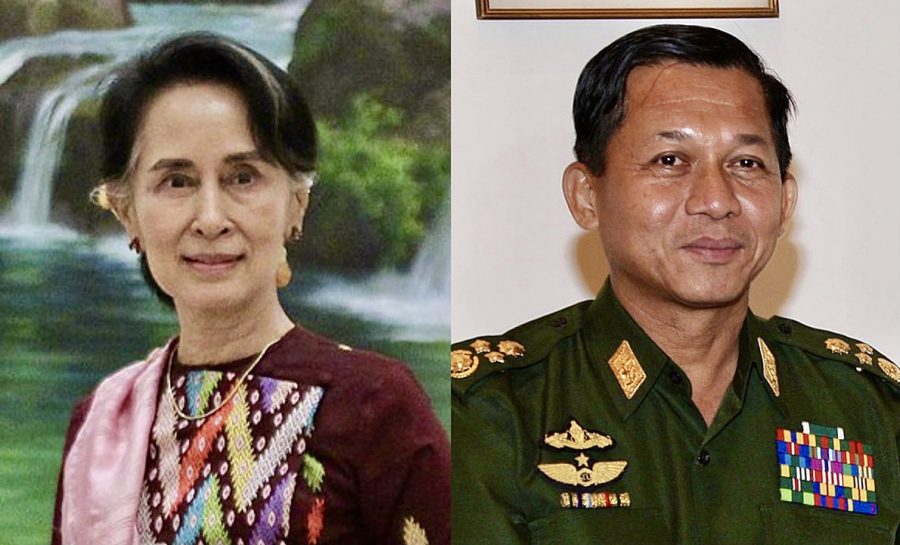Coup in Myanmar
Deposed leaders Aung San Suu Kyi (left), and Coup leader Min Aung Hlaing (right)
On the morning of Feb. 1, the democratically elected members of the National League for Democracy (NLD), Myanmar’s ruling party, were ousted in a coup d’état by Myanmar’s military, the Tatmadaw. The Tatmadaw then vested power in Min Aung Hlaing, the Commander-in-Chief of Defense Services, and declared a year-long state of emergency. The members of parliament, elected in November 2020, were set to be sworn in on Feb. 2, but the coup prevented this. The military detained President Win Myint and State Counsellor and Nobel Peace Prize laureate Aung San Suu Kyi, who is the effective leader of the country. Parliament members, and many ministers and deputies were also detained.

This is the second time the military has detained Aung San Suu Kyi. Since declaring independence from Britain in 1948, Myanmar was in a state of perpetual instability until 1988, when nationwide protests broke out. These protests amounted to little as the military reclaimed power after several months of civil unrest. The military began a transition to democracy and Aung San Suu Kyi and her party, the NLD were democratically elected in free elections in 1990, but the military refused to cede power, placing Aung San Suu Kyi under house arrest, and the military retained control until 2015, when elections were held, resulting in a landslide victory for Aung San Suu Kyi. However, the military still retains significant power and has the right to appoint 25 percent of parliamentary positions.
In the November 2020 elections, the NLD won by its greatest margin ever, with the military’s proxy party winning only 33 of the 476 seats. The military declared the election fraudulent and disputed the result. International observers noted that while the election was primarily free, there was some inequity in the use of state resources.

Additionally, the persecuted Rohingya ethnic minority was not allowed to vote in the election.
In an early morning raid on Feb 1., various NLD party leaders were kidnapped and detained by the military. Starting around 3 a.m, phone lines, television, and the internet were shut down in the capital. Over 400 members of the parliament were placed under house arrest in a governmental complex. Soldiers were seen in Yangon, the largest city, and Naypyidaw, the capital. Later that day, the military announced on a military-controlled channel that they had taken control of the country for a year. On Feb. 2, Min Aung Hlaing, the military-appointed head of state, established a new executive governing body. To legitimize Aung San Suu Kyi’s arrest, on Feb. 3, the police filed criminal charges against her for illegally importing at least ten walkie-talkies.
Southeast Asia and the rest of the world have protested the coup and the detention of 75-year-old Aung San Suu Kyi. On Feb. 3, healthcare workers and teachers across Myanmar led a labor strike. The coup also met resistance on Feb. 3 with the genesis of a domestic boycott movement called “Stop Buying Junta Business,” an effort to boycott all services and products linked to the military. Around the world, political leaders, including President Joe Biden, have demanded the coup’s reversal.

Quinn Ennis ‘22 occasionally wrote for the Advocate from 6th grade through 10th grade but began to approach journalism more seriously during the pandemic...












